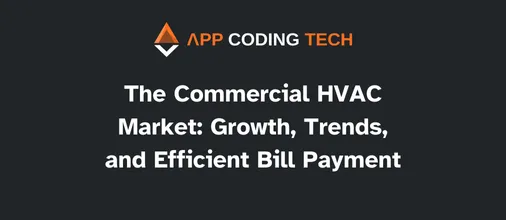DISCOVER ANY
ARTICLES HERE
All the articles and contents of the site have been up to date and
you can find your articles and content easily.

All the articles and contents of the site have been up to date and
you can find your articles and content easily.



Haseeb Khan
3 September, 2024
The commercial HVAC market is a rapidly expanding industry, driven by the increasing demand for climate control solutions in commercial and industrial settings. HVAC systems, which include heating, ventilation, and air conditioning technologies, play a crucial role in ensuring indoor comfort and air quality. With an ever-growing need for such systems, the market is evolving, presenting new opportunities and challenges for businesses and consumers alike.
In this article, we’ll delve into the current trends in the commercial HVAC market, its growth, and the most efficient ways to handle HVAC bills. By the end of this article, we will also guide you on how our marketing services at App Coding Tech can assist you in making your HVAC business stand out online and help streamline your billing process.
The commercial HVAC market encompasses the sale, installation, and maintenance of HVAC systems in commercial spaces like office buildings, hotels, factories, hospitals, schools, and retail outlets. These systems ensure temperature control, improve air quality, and regulate humidity levels.
The rapid growth of urbanization, coupled with increasing industrialization, has contributed significantly to the rise of the commercial HVAC market. Businesses are placing greater importance on energy-efficient solutions and air quality, leading to increased demand for advanced HVAC systems.
Some key factors driving growth in this market include:
Energy Efficiency: As businesses strive to cut costs and reduce their carbon footprint, energy-efficient HVAC systems are becoming a priority. The U.S. Department of Energy reports that commercial buildings account for nearly 19% of the total energy used in the country, making HVAC systems a focal point for energy-saving initiatives.
Technological Advancements: The integration of smart technology in HVAC systems allows for greater control over energy consumption. Systems with IoT capabilities, predictive maintenance, and remote access are gaining popularity in commercial settings.
Government Regulations: With stringent regulations on energy use and carbon emissions, many commercial spaces are upgrading to more efficient HVAC systems. Government incentives and rebates further support this transition.
The commercial HVAC market has witnessed several key trends shaping its future:
Energy-efficient HVAC systems reduce operating costs, improve environmental sustainability, and align with the growing trend of green building certifications like LEED. Energy Star-rated systems, which meet rigorous energy efficiency standards, have become highly sought after in commercial buildings.
Smart HVAC systems that integrate with building management systems (BMS) are gaining traction. These systems can automatically adjust temperature, ventilation, and humidity levels based on real-time data, optimizing comfort and reducing energy consumption. According to a report by MarketsandMarkets, the smart HVAC market is expected to grow significantly in the coming years.
Remote monitoring allows facility managers to keep track of HVAC system performance in real-time. Predictive maintenance, powered by AI and machine learning, can anticipate system failures before they occur, reducing downtime and repair costs.
The shift towards more sustainable refrigerants is another major trend. New refrigerants that have lower global warming potential (GWP) are replacing older, harmful ones, in compliance with global environmental standards.
Despite its rapid growth, the commercial HVAC market faces several challenges:
Installing energy-efficient and smart HVAC systems can involve a significant upfront investment, which can be a barrier for some businesses, especially small to medium-sized enterprises.
As HVAC technology becomes more advanced, there’s a growing demand for skilled technicians who can install, maintain, and repair these systems. The shortage of qualified workers in the HVAC sector can slow down market growth.
Though energy-efficient systems help reduce energy consumption, businesses still face ongoing maintenance costs. Routine maintenance is essential to keep HVAC systems running efficiently and to avoid costly repairs in the future.
One of the most significant concerns for businesses when it comes to HVAC systems is the cost. From installation and maintenance to energy consumption, HVAC systems can significantly impact a company's bottom line. However, there are several strategies to efficiently manage and pay these bills.
Investing in energy-efficient HVAC systems can save your business a considerable amount in the long run. These systems consume less energy while providing optimal comfort, thus reducing your monthly utility bills.
Routine maintenance helps identify issues early, ensuring that your HVAC systems run smoothly without any unexpected breakdowns. Well-maintained systems operate more efficiently, leading to lower energy consumption and reduced repair costs.
By installing smart HVAC systems, businesses can optimize energy usage based on demand and occupancy levels. These systems can automatically adjust temperature settings, resulting in reduced energy wastage and lower utility costs.
Zoning systems allow you to heat or cool specific areas of your commercial space as needed, rather than conditioning the entire building. This can lead to significant energy savings.
With the growth of the commercial HVAC market, businesses need to focus on digital marketing to stay competitive. A strong online presence can help HVAC companies generate more leads, enhance brand recognition, and improve customer engagement.
Search Engine Optimization (SEO): SEO helps increase your website’s visibility on search engines, making it easier for potential customers to find your HVAC services when they search for related terms.
Pay-Per-Click Advertising (PPC): Paid search campaigns are an effective way to generate immediate traffic to your website. By targeting the right keywords and locations, HVAC businesses can attract local customers searching for HVAC solutions.
Social Media Marketing: Platforms like Facebook, LinkedIn, and Instagram provide opportunities to engage with potential clients, showcase your services, and share educational content about HVAC systems.
Content Marketing: Offering valuable content, such as blog posts, videos, and guides, positions your HVAC business as an authority in the industry. This helps build trust with your audience and increases conversion rates.
At App Coding Tech, we specialize in digital marketing services tailored to businesses in the HVAC industry. Our expertise in SEO, PPC, and content marketing will help your HVAC company reach its target audience and generate more leads.
We also provide web design and development services that are optimized for user experience (UX), ensuring that your customers can easily access information, book services, and pay their HVAC bills online. With our help, you can build a more efficient and profitable HVAC business.
The commercial HVAC market is growing rapidly, driven by the need for energy-efficient, technologically advanced HVAC systems. While businesses face challenges, there are effective strategies to manage costs, including investing in energy-efficient systems and implementing smart technology. Digital marketing plays a crucial role in helping HVAC businesses stand out and attract more customers.
If you’re looking to improve your HVAC business's online presence and optimize your digital marketing strategies, App Coding Tech is here to help. Contact us today to learn how our tailored services can help your business grow and succeed in the commercial HVAC market.
What are the different types of digital marketing?
Before we get into why digital marketing is important for business, you need to know about the different types of digital marketing you can use.
In simple terms, Search Engine Optimisation, or SEO, is all about using keywords on a website in order to improve its ranking on search engines and increase traffic. The higher placed your website is on Google’s search results, the better your brand’s chances of being recognised.
As well as keywords, good SEO practice relies on internal linking, authoritative content, good website navigation, and other important factors.
Content marketing focuses on providing additional value to customers through expert-driven articles, blogs, videos, and other resources like whitepapers.
The aim of content marketing is to create and promote content that generates brand awareness, lead generation, and traffic growth. Ultimately, you must create engaging, informative content that hooks the customer and attracts them to your brand.
Fast becoming one of the most important digital marketing tools for a business, social media is a great way of promoting your brand and expanding your reach. It allows you to communicate with customers in an engaging way and helps to make them feel part of the brand.
Whether it’s Instagram, Facebook, TikTok, Twitter, LinkedIn, or YouTube, you need to consider which platform works the best for your business and which channel is used the most by your target audience.
Social media helps you reach your customers organically but also gives you the option to boost posts and promote content through paid advertising.
This allows your content to reach a much wider audience, increases the level of engagement on your posts and gives you the opportunity to specifically target individual interests and demographics.
PPC helps to drive traffic to your website by paying a publisher every time your advert gets clicked. Types of PPC include Google Ads, Facebook Ads, Twitter Ads, and sponsored LinkedIn content.
While it may not be as organic as other types of digital marketing, it’s still a key component of any successful digital marketing strategy.
While it may be seen by many marketers as a bit old school, email marketing is still an essential digital marketing tool. It allows you to send personalised emails to your customers and helps you to reach all age demographics within your target audience.
Email marketing can be used to promote content, discounts, events, news, and competitions. Plus, it’s a great way of redirecting customers to your website.
Influencer marketing is a proven way of promoting your brand using an engaging and modern approach. It allows businesses to collaborate with individuals who have a big online presence, which will ultimately help a brand’s exposure. Influencer marketing comes in many different forms, but usually, an influencer will be asked to publish social media content that promotes the brand. It goes without saying, but it’s essential that the influencer is well-known among your target audience and a good face for your business.
Why digital marketing is important for business
Why is digital marketing important? Well, there are a whole host of reasons that we will explore in this section, but in simple terms, it allows you to reach a larger audience and boost brand awareness.
All of the reasons we list here, if applied correctly, should help you to attract customers new and old and drive future sales.
Good for brand growth and awareness
Digital marketing levels the playing field and allows you to compete with bigger brands in your sector that otherwise wouldn’t be achievable.
The internet is home to a huge source of potential customers, so by marketing your brand using the above techniques we discussed, you’re able to target a lot more people than you would normally.
Using these different digital marketing channels, your brand will grow and become more widely recognised, helping to raise awareness about what you do and the products or services you sell.
Targets online customers
As of January 2023, there were 5.16 billion internet users worldwide, which means there are quite literally billions of people out there that may be interested in your brand.
Your customers are online waiting to discover your brand and a good digital marketing strategy will be able to tap into this potential. The more exposure your brand receives, the more likely you’ll attract new customers.
The majority of people now use the internet to find out about businesses, so you’d be crazy to not have an online presence and be involved in the conversation. If people can’t find your business online, then the chances are that they’ll choose a competitor and you’ll lose a potential customer.
© Copyright App Coding Tech. All Rights Reserved